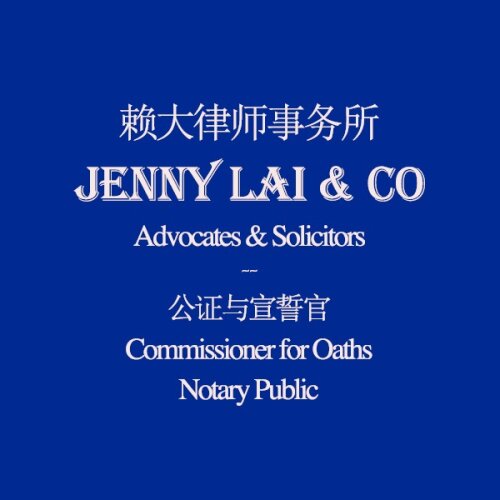Best Family Lawyers in Chinatown
Share your needs with us, get contacted by law firms.
Free. Takes 2 min.
Free Guide to Hiring a Family Lawyer
List of the best lawyers in Chinatown, Singapore
Singapore Family Legal Articles
Browse our 3 legal articles about Family in Singapore written by expert lawyers.
- How to File for Divorce in Singapore: Step-by-Step Guide
- Most family issues in Singapore (marriage, divorce, custody, maintenance, family violence) are governed by the Women's Charter and handled by the Family Justice Courts (FJC); Muslim marriages and divorces generally go through the Syariah Court under the Administration of Muslim Law Act. For divorce, you must show an irretrievable breakdown... Read more →
- The Fundamentals of Commencing a Divorce in Singapore
- There is actually only one ground of divorce in Singapore; the irretrievable breakdown of the marriage which is to be found in Section 95 of the Women’s Charter. To prove that the marriage has irretrievably broken down, you must be able to prove to the Court one of the 5... Read more →
- Ancillary Matters: Child Custody, Care & Control, Access of Children
- This article will only apply to parties with children under 21 years old. The Court has repeatedly placed emphasis on the best interests of the welfare of the children. The children’s welfare is measured in terms monetary and physical comfort with the parent, the ties of affection with the parent,... Read more →
About Family Law in Chinatown, Singapore
Family law in Chinatown, Singapore focuses primarily on issues related to domestic relations, including marriage, divorce, custody- and access-related matters, property disputes, maintenance, and matters concerning children. Family law cases in Chinatown are typically heard and resolved by the Family Justice Courts, which apply Singaporean statutory law and principles of equity and common law.
Why You May Need a Lawyer
Each situation is unique, but you may require legal help in family matters if you are contemplating a divorce, faced with custody-, access- or maintenance-related issues, or if you are involved in a dispute related to matrimonial assets. Even in circumstances that are seemingly straightforward, a thorough understanding of your rights and obligations under the law is crucial to protect your interests and, when applicable, those of your children.
Local Laws Overview
Chinatown, Singapore, abides by the local laws set out by Singapore's central government. These include the Women's Charter, which provides the legal framework for marriage and divorce matters, the Adoption of Children Act, and the Guardianship of Infants Act. Key considerations in such laws are the best interest of the child, fair division of matrimonial assets, and the financial maintenance of dependent spouses and children.
Frequently Asked Questions
1. Can I handle my divorce without a lawyer?
While it is possible to file divorce papers on your own, especially in an uncontested divorce, you may find it challenging to navigate the complex legal system. A family lawyer can provide necessary legal advice and ensure your rights are well-protected.
2. How is child custody determined?
In Singapore, courts favour joint custody, allowing both parents to have a say in the child's upbringing. However, the child's living arrangement (care & control) is usually granted to one parent, with the other granted access.
3. How are assets divided during a divorce?
Division of matrimonial assets is based on the principle of just and equitable distribution. The court takes into account several factors such as each party's contribution to the marriage, both financial and non-financial.
4. What does maintenance entail?
Maintenance refers to financial support granted to a dependent spouse or child. It may include monthly payments, lump-sum payments, or a combination of both.
5. What if we are cohabiting but not legally married?
In Singapore, common-law relationships are not recognized. Therefore, property rights, maintenance, and other protections afforded to legally married couples do not apply.
Additional Resources
The Family Justice Courts and the Singapore Mediation Centre can provide helpful resources related to family laws. Additionally, organizations like the Pro Bono Services Office, Law Society of Singapore offer legal advice and facilitate community legal clinics.
Next Steps
If you need legal assistance in family matters, the first step is to reach out to a reputable family law attorney. Having an initial consultation can provide clarity about your legal position and guide you on how to proceed. Being honest and detailed about your specific situation can help your lawyer provide the best possible advice.
Lawzana helps you find the best lawyers and law firms in Chinatown through a curated and pre-screened list of qualified legal professionals. Our platform offers rankings and detailed profiles of attorneys and law firms, allowing you to compare based on practice areas, including Family, experience, and client feedback.
Each profile includes a description of the firm's areas of practice, client reviews, team members and partners, year of establishment, spoken languages, office locations, contact information, social media presence, and any published articles or resources. Most firms on our platform speak English and are experienced in both local and international legal matters.
Get a quote from top-rated law firms in Chinatown, Singapore — quickly, securely, and without unnecessary hassle.
Disclaimer:
The information provided on this page is for general informational purposes only and does not constitute legal advice. While we strive to ensure the accuracy and relevance of the content, legal information may change over time, and interpretations of the law can vary. You should always consult with a qualified legal professional for advice specific to your situation.
We disclaim all liability for actions taken or not taken based on the content of this page. If you believe any information is incorrect or outdated, please contact us, and we will review and update it where appropriate.
Browse family law firms by service in Chinatown, Singapore
Chinatown, Singapore Attorneys in related practice areas.












